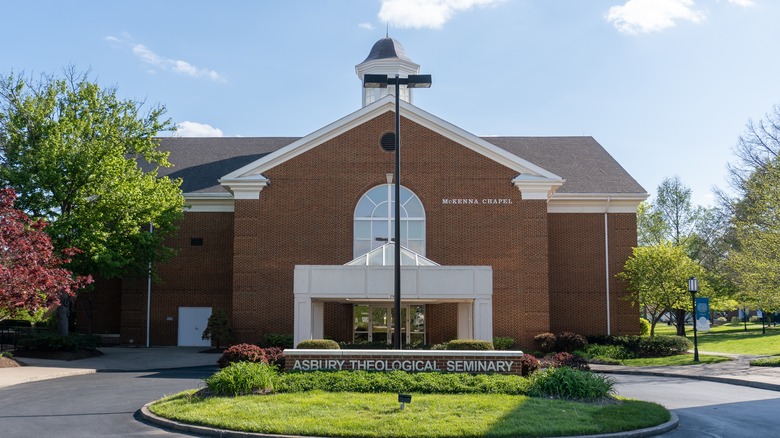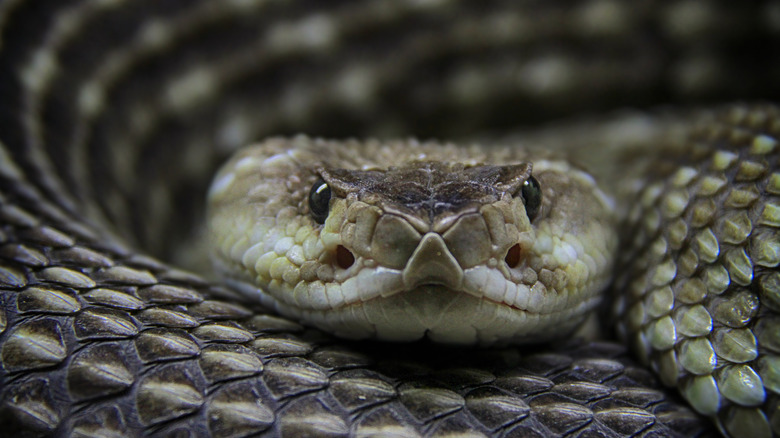The Unexpected Thing That's Illegal To Do In Kentucky Churches
It's a famous internet staple that many American states have seemingly ridiculous laws on their books. Many from days gone by, such as the law in Virginia that classifies unmarried sex as a misdemeanour, exist but are not enforced. Others, like the alleged law in Georgia that says its illegal to carry ice cream in your pocket, are entirely apocryphal.
But there are some laws that, while they sound bizarre at first, are intended to deal with a pressing state issue. As reported by The Courier Journal, one such law exists in Kentucky — it stipulates that "any person who displays, handles or uses any kind of reptile in connection with any religious service or gathering shall be fined not less than $50 nor more than $100." As strange as this legislation may sound, the fact is that in Kentucky, reptiles — specifically snakes — have often been used in church services, with "snake handling" seen as a religious ritual in certain denominations.
You might say that the state has no right to prevent the use of reptiles in religious services. The United States is in part founded on the principle of religious freedom, after all. However, in many cases, the snakes used in handling sessions are venomous, meaning that such rituals represent a danger to public health, hence the state intervention. The law has been in place since 1942, and it has a pretty interesting history.
The practice of religious snake handling
Handling animals in religious ceremonies is nothing new. The idea of animal sacrifice — a ritual in which a live creature is killed in honor of a deity that would then be compelled to watch over the congregation — exists in several religions around the world. But outside of a few Native American tribes, religious snake handling is mostly a Christian practice, found mostly in Appalachia, and it's a surprisingly modern phenomenon.
In the New Testament's Gospel of Mark, it is claimed that there are several "signs" that Christian beliefs are true. "And these signs shall follow them that believe; In my name shall they cast out devils; they shall speak with new tongues; They shall take up serpents; and if they drink any deadly thing, it shall not hurt them; they shall lay hands on the sick, and they shall recover." Dozens of Pentecostal churches in Kentucky interpreted this passage literally, leading to the rise of snake handlers who made it their task to capture the deadly reptiles and hold them aloft during services. They believed that avoiding a bite was proof that they were protected by God.
Along with drinking poison — usually watered down strychnine — snake handling became commonplace in Appalachian Pentecostal churches at the start of the 20th century. Even experienced snake handlers would sometimes be bitten, and depending on their religious beliefs, they would either seek help from a doctor or reject medical attention. In this case, they believed that God would nevertheless protect them even though the bite had occurred.
A bust made headlines in 2008
You may assume that the practice of religious snake handling is from a bygone age, and that the Kentucky law forbidding the practice in services would have killed it entirely. But eye-popping 2008 reports proved that snake handling is still alive and well in the 21st century. In July of that year, 11 people were arrested at the Full Gospel Tabernacle in Jesus Name in Middlesboro, Kentucky amid a crackdown on the illegal trafficking of venomous snakes. More than 100 snakes, including 42 copperheads, 11 timber rattlesnakes, two cobras, and a puff adder, were confiscated. Some had been imported from Asia and Africa.
Among those arrested was Gregory James Coots, the pastor of the church at which a woman had been bitten by a snake and died in 1995. Her husband died in an identical incident in another church three years later. Coots himself died after being bitten by a snake during a ceremony in 2014. Despite the dangers and the law in question, snake handling continues its long and controversial history in Kentucky and in the Coots family even today.

